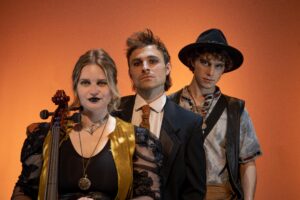When I first walked into the Metro Studio to see the Fringe production Castle of Glass, I immediately sensed something was different from the status quo. Usually, before theatre shows, the audience is greeted with the eerie silence of an empty stage, or the sounds of pre-recorded music piped in over the speakers. Instead, a cellist and a guitarist sat quietly playing a simple melody, releasing the tension built up over a long day. As it turns out, this was only the beginning of the subversion of expectation.
Castle of Glass is a performance by the Victoria-based folk-rock trio Wasteland Preachers, which consists of lead writer and vocalist Jeremy James Sinclair with backup vocals provided by cellist Devon Side-Walker, and Christopher Mattila on acoustic guitar and kick drum.

As the audience quiets, Sinclair, sharply dressed in a modest suit, walks out from the back, carrying a stool, and a drink. He begins to recite poetry with the flair of someone who understands the melody and rhythm of words themselves, exclusive of music, flowing from one stanza to the next, like waves lapping upon a sandy shore. Then, he begins to sing a vulnerable, soulful tune, juxtaposing the imagery of hopeful childhood and the gradually lost innocence of adulthood. Through song, he tells a story of heartbreak, pain, and growth, finally ending up on the coast at night, buffeted by the salty air, coming to brave terms with his struggle.
At this point, I thought it was yet another “sad beginning, happy ending” inspirational story we’ve heard millions of times before. Functional but safe. Then, something else happens. All of Sinclair’s hope and optimism falls apart. Morning arrives, and the whisper of the ocean turns into the filthy clamour of an undulating city. The feeling of strength fades, and despair returns. In fact, over the course of an hour, this happens over, and over, and over again, with hope destroyed by heartbreak only to rise and fall, and rise again.
All the while, Sinclair is being visibly torn down. His pristine suit is gradually stripped off to reveal a wrinkled, untucked, stained undershirt, and the drink he brought on stage is shown to be a can of beer that he consumes with increasing desperation, until the can, like himself, becomes nothing more than a mutilated, empty shell, loved intensely then hurled away with spiteful violence. The songs he sings increase in tempo, pitch, and frenetic energy, sometimes raw, screaming, and incoherently articulated, crying out in an anguished plea for emotional solace.
This is the conceptual brilliance of Castle of Glass. Rather than sterilizing and optimizing the personal growth process to something polished and inspiring, Sinclair instead exalts in its gruelling dysfunction. The dizzying parabolic swings between the exquisite optimism of new love and the evisceration of self when unbridled affection turns to seething resentment are so frequent that, at least for myself as a writer, a nagging sense of unease formed, an unconscious desire to trim off the needless redundancy, to “tighten the script” to something more efficient.
But Sinclair instead embellishes it, and I believe the whole point is to trap the audience in an ad nauseam rollercoaster, where a growing sense of bewilderment, futility, and frustration puts us right in the shoes of the protagonist.
Throughout the runtime it’s clear to see that the deeply personal story on offer is largely autobiographical, with frequent fourth-wall breaks and ironic humour, and this establishes immense trust with the audience. Sinclair is turning the naked spotlight onto himself, doing away with any concept of masculine bravado and revealing a deeply vulnerable human who has stared into the existential abyss and welcomed death.
It gets better, though. The more pain Sinclair overcomes, the stronger he gradually becomes, more sure of himself, more determined to rise above, until he eventually finds himself welcoming death from an entirely different perspective. Although I’m paraphrasing, he says something like, “Have you ever met someone with whom you are so completely connected, that even if you died in this very moment, as long as you’re holding their hand, it would be okay?”
Castle of Glass challenges you to remember what it was like to be a child brimming with optimism, to build an elaborate, shimmering crystal castle out of the most extravagant materials in your toy box. When it inevitably falls and shatters into millions of razor shards that cut you into unrecognizable pieces of the person you thought you were, take a deep, ragged breath, curl up and cry a little, then build your castle again, not fearlessly, but courageously.
Victoria Fringe Festival
Until Sunday, September 1
Various times, dates, and venues
intrepidtheatre.com/festivals/fringe-festival
